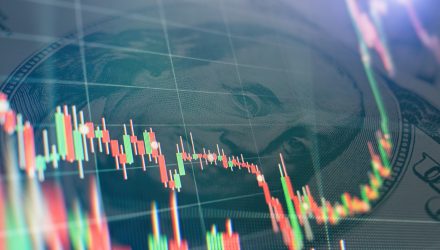Stocks and index ETFs are surging higher on on Monday, continuing the strong run from last week, as a key spike in U.S. job growth last month elevated anticipation for a faster economic recovery from the pandemic.
Two of the three major stock indexes are hitting fresh highs on Monday. The Dow Jones Industrial Average rallied 400 points, or 1.2%, to score a new a all-time high, while the S&P 500 rose 1.5% to notch its own new record after closing above 4,000 for the first time last week. The Nasdaq Composite also joined the bounce, gaining 1.4% as it looks to test February’s all-time highs.
Major stock ETFs are shooting higher after the long weekend as well. The SPDR Dow Jones Industrial Average ETF (DIA), SPDR S&P 500 ETF Trust (SPY), and Invesco QQQ Trust (QQQ) are all gaining just after noon EST.
The Labor Department reported Friday that non-farm payrolls grew by 916,000 last month, the highest since August 2020, while the unemployment rate dropped to 6%. Economists queried by Dow Jones were projecting growth closer to 675,000 and a jobless rate of 6%.
Analysts credit the change to the easing of pandemic-era restraints, widespread vaccine rollouts, and the distribution of fiscal stimulus.
“This reflects the lifting of restrictions, ramp-up in vaccinations and boost provided by the fiscal stimulus,” said Anu Gaggar, senior global investment analyst at Commonwealth Financial Network. “Faster jobs and wage growth can have an upward pressure on prices and test the Fed’s patience with easy monetary policy.”
Amid the reopening enthusiasm, travel stocks like airlines and cruise operators shined. American Airlines and United jumped more than 4% each, helping to boost the U.S. Global Jets ETF (JETS) more than 2.66%, while The First Trust Consumer Discretionary AlphaDEX Fund (FXD) also climbed, amid Carnival and Norwegian Cruise Line gaining 5.9% and 7.8%, respectively.
Stock indexes and stock ETFs are driving higher thanks to recent strength following President Biden’s introduction of his multitrillion-dollar infrastructure proposal, which concentrates on rebuilding roads, bridges, and airports, growing broadband access, boosting electric vehicle use, and updating the country’s electric grid. The plan will be funded partly by an increase in the corporate tax rate to 28%.
The central bank is also planning to release the meeting minutes from its March FOMC meeting on Wednesday of this week. The notes should offer insight into the policymakers’ thinking over whether some members were likely to overlook the first signs of a hastening economic recovery in determining the scope of monetary policy.
“At last month’s meeting, the FOMC significantly upgraded their economic forecasts yet kept their median interest rate projections unchanged. As such, a close eye will be kept on any discussions that shed light on the disconnect between the hawkish economic forecasts and the dovish dots,” Wells Fargo economist Sam Bullard wrote in a note Monday morning. “While the consensus of the FOMC continues to suggest that the committee will wait for their forecasts to be realized before taking policy action, it will be interesting to see if there is any intense discussion about the implications of the stronger outlook, particularly around inflation. Most Fed officials expect any pick-up in inflation to be “transitory,” yet we suspect there are a few officials that are pushing back on that narrative.”
Meanwhile, the U.S. reported another daily record of new Covid vaccinations Saturday, driving the weekly average of new shots per day above 3 million.
For more market trends, visit ETF Trends.
